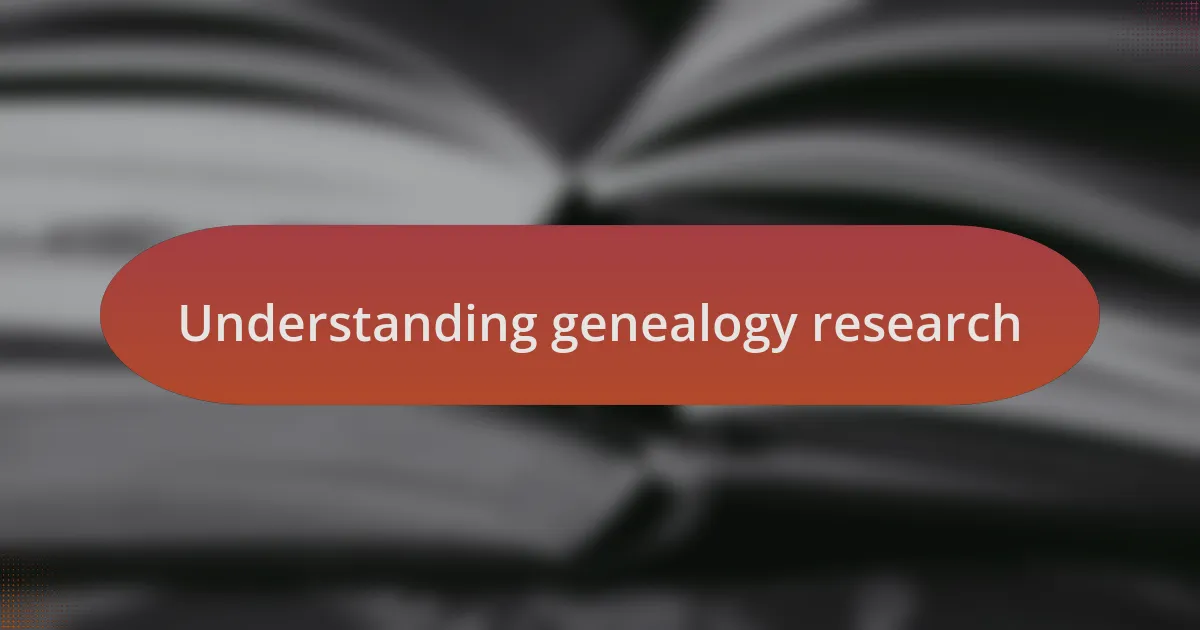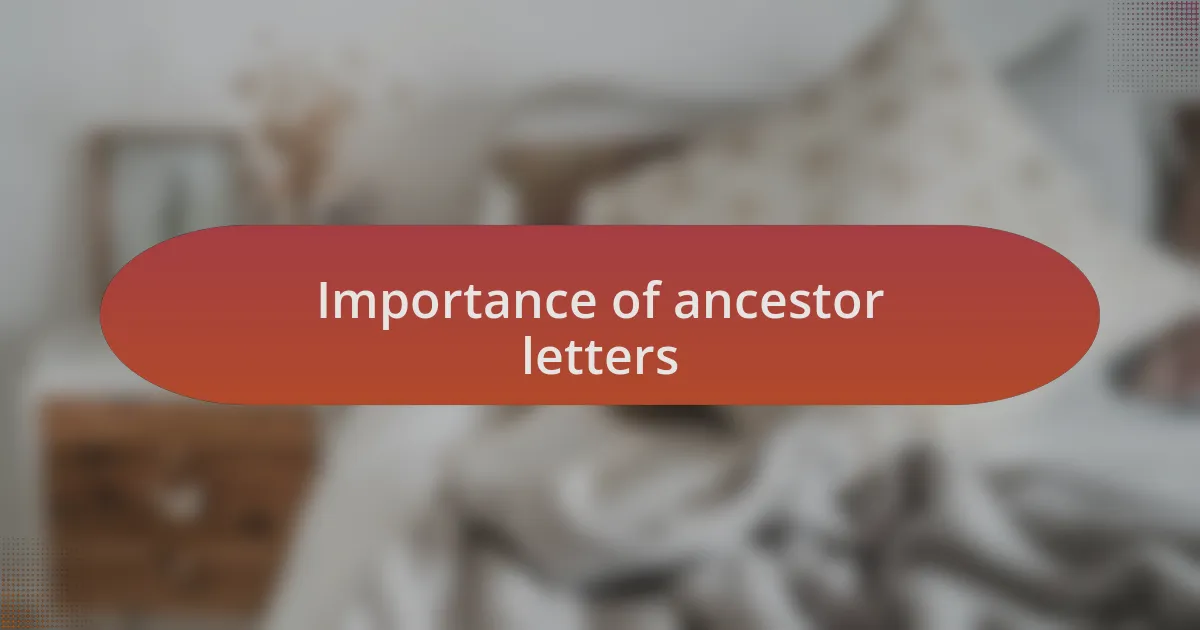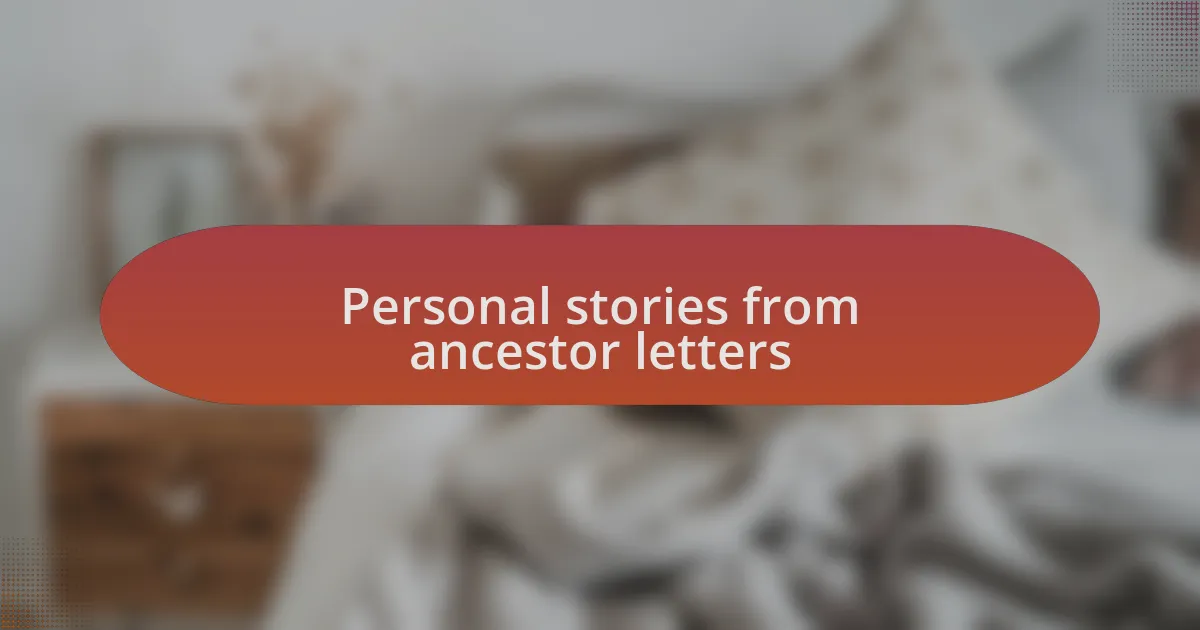Key takeaways:
- Genealogy research is an emotional journey that reveals the narratives and struggles of ancestors, enhancing personal identity.
- Ancestor letters offer unique insights into personal histories, family dynamics, and the resilience of past generations.
- Effective organization of findings, including digital archiving, allows for easier access and reflection on familial connections.
- Analyzing the content and context of letters uncovers deeper understanding of ancestors’ lives and broader societal changes.

Understanding genealogy research
Genealogy research can feel like piecing together a vast puzzle, where each ancestral letter or document represents a missing piece. I remember the thrill when I uncovered a letter from my great-grandmother—it was like she reached out across generations to share her life’s story. Don’t you feel that sense of connection when you find something that resonates with your own history?
As I delved deeper into my family’s past, I realized that genealogy is not just about names and dates; it’s about the narratives that shape who we are. I often wondered how my ancestors faced their challenges and what dreams they held. Engaging with their letters transformed my understanding of them—suddenly, they were more than just names on a family tree.
The emotional richness of this research can be overwhelming; it’s normal to feel a mix of joy and sadness as you uncover the lives of those who came before you. I found myself reflecting on the hope, struggles, and resilience that echoed through each letter. Each discovery brings forth a question: How do these stories influence my own life today?

Importance of ancestor letters
Letters from our ancestors hold immense significance in the realm of genealogy. They provide a unique glimpse into the daily lives, hopes, and challenges of those who came before us. I remember opening a dusty envelope from my grandfather, and as I read his words, I was transported to a different time—his dreams and fears unfolded on the pages, revealing a depth that names alone could never convey.
These letters not only chronicle personal histories but also capture the essence of family dynamics. When I discovered a heartfelt letter between my great-aunt and her cousin, I was struck by the candidness of their emotions and thoughts, which felt almost intimate. This correspondence helped me understand the support networks that existed within my family during tough times—how they leaned on each other, and how their bonds shaped the lineage I now cherish.
Moreover, the stories hidden within these letters can inspire us in our present lives. Each message often contains life lessons and advice that resonate even today. It’s fascinating to think about how many of our own struggles echo those of our ancestors. Have you ever considered how much their experiences might guide you through your own challenges? I find comfort in knowing that their resilience lives on through me, igniting a sense of connection that transcends time.

Where to look for letters
Searching for letters from our ancestors can lead you down many intriguing paths. I often start my quest in attics, basements, or old family homes, places where boxes of forgotten treasures are waiting. It’s amazing what you can find tucked away—old trunks filled with letters, postcards, and envelopes that tell stories waiting to be uncovered.
Libraries and local archives can be goldmines for historical letters. I vividly recall my visit to a small town library where I discovered a letter written by my great-grandfather during World War II. The librarian pointed me to a collection of correspondences that opened a window into his experiences and thoughts, revealing a side of him I never knew. Have you thought about the historical context of where your ancestors lived? Exploring regional archives not only connects you with personal family letters but also with the broader narrative of their community.
Don’t overlook online resources either. Digital collections and genealogy websites often host scanned letters and documents that can be accessed from the comfort of your home. I remember the thrill of finding an old letter digitized on a genealogy platform, instantly feeling a connection across time and distance. How often do we consider that letters preserved in the digital age can spark a sense of belonging to something greater? Each letter is a piece of a larger puzzle, waiting for us to assemble it.

Organizing your findings
Organizing your findings can feel overwhelming, especially when you’ve unearthed a treasure trove of letters. I remember sitting on my living room floor, surrounded by piles of documents and small envelopes, each holding a different story. What helped me was creating a simple system: I categorized the letters by family member, date, or event. This way, I could easily trace connections and themes as though I was piecing together a live family drama.
As I sifted through my grandmother’s letters, I felt a sense of connection to her life during tough times. I started labeling the letters with sticky notes that had key themes and emotions—like “love,” “loss,” or “resilience.” This method not only helped in organizing the data but also turned the process into a reflective journey. Have you ever thought about how emotional organizing can enhance your understanding of your family’s past?
Creating a digital archive was a game-changer for me. Scanning old letters and organizing them into folders on my computer allowed for easy access and preservation. Each file felt like a window into my ancestors’ hearts, and I often found myself revisiting them, propelled by curiosity. How do you store your findings so they remain accessible and meaningful? A structured digital format, combined with heartfelt annotations, can breathe life into your family history, making it easier for future generations to connect with their heritage.

Analyzing the content of letters
When analyzing the content of your ancestors’ letters, pay close attention to the language, tone, and emotional undertones present in their writing. I recall reading a letter from my great-grandfather during a particularly hard winter. The words he chose conveyed not just the struggle of daily life but also an unwavering hope that resonated with me deeply. This close reading can reveal layers of understanding about their experiences, reflecting their resilience and challenges.
I suggest looking for recurring themes throughout the letters. For instance, while reviewing a series of correspondence between two distant relatives, I started noticing mentions of community gatherings and shared celebrations. These hints revealed not only family connections but also the social fabric of their lives, highlighting how events shaped their experiences. Isn’t it fascinating how love or sorrow can be threaded through even the most mundane of updates?
Lastly, consider the context in which these letters were written. When I found a batch of letters exchanged during WWII, I was struck by the palpable fear and uncertainty woven into the text. This changed my perception of that period, helping me understand my family’s history in a broader context. What stories can you uncover about the times your ancestors lived in? Their words may provide not just personal histories but also insights into broader societal changes, giving depth to your genealogical research.

Personal stories from ancestor letters
Reading my grandmother’s letters from her early marriage days was like stepping into her life. She wrote about the joy of building a home, often adding little notes about the flowers she grew in her garden. It’s incredible how her words painted vivid images of love and hard work; I could almost smell the fresh blooms as I read.
Another letter that moved me deeply came from my uncle, who wrote to my father during a tough time in his life. He shared his dreams and fears so openly, and I felt a connection to my family’s struggles that transcended generations. Why do we often overlook these intimate glimpses into our ancestors’ lives? It’s in those raw moments of vulnerability that we can truly understand their humanity.
One of the most striking stories I discovered was hidden within a series of letters during the Great Depression. My ancestor’s tales of resilience amidst hardship were astonishing. They detailed not just survival, but shared laughter and community support during difficult days. How could they find joy in such trying times? Their ability to focus on hope taught me lessons about endurance that resonate even today.